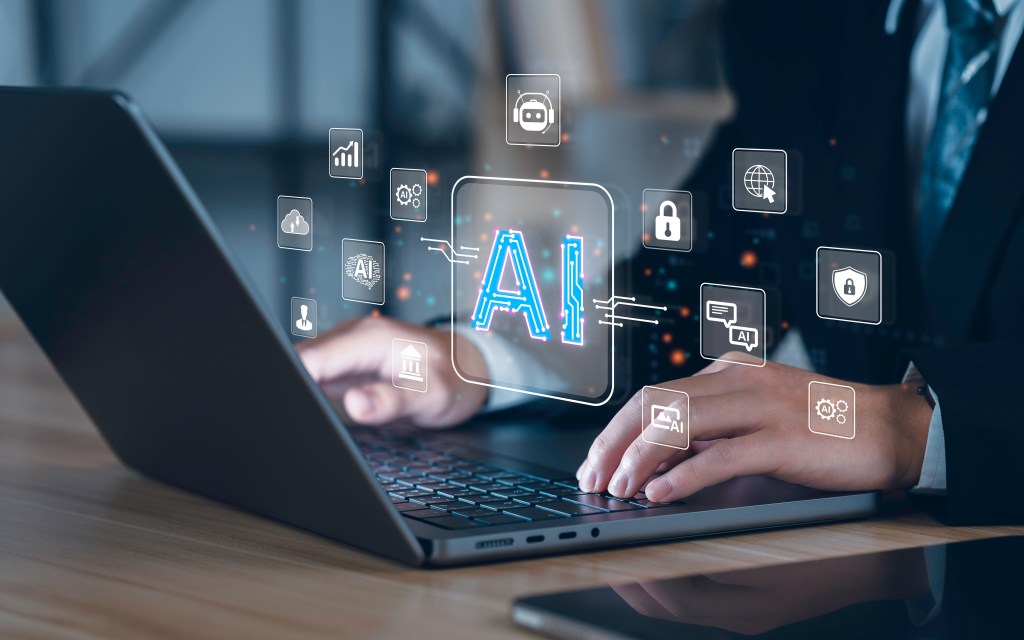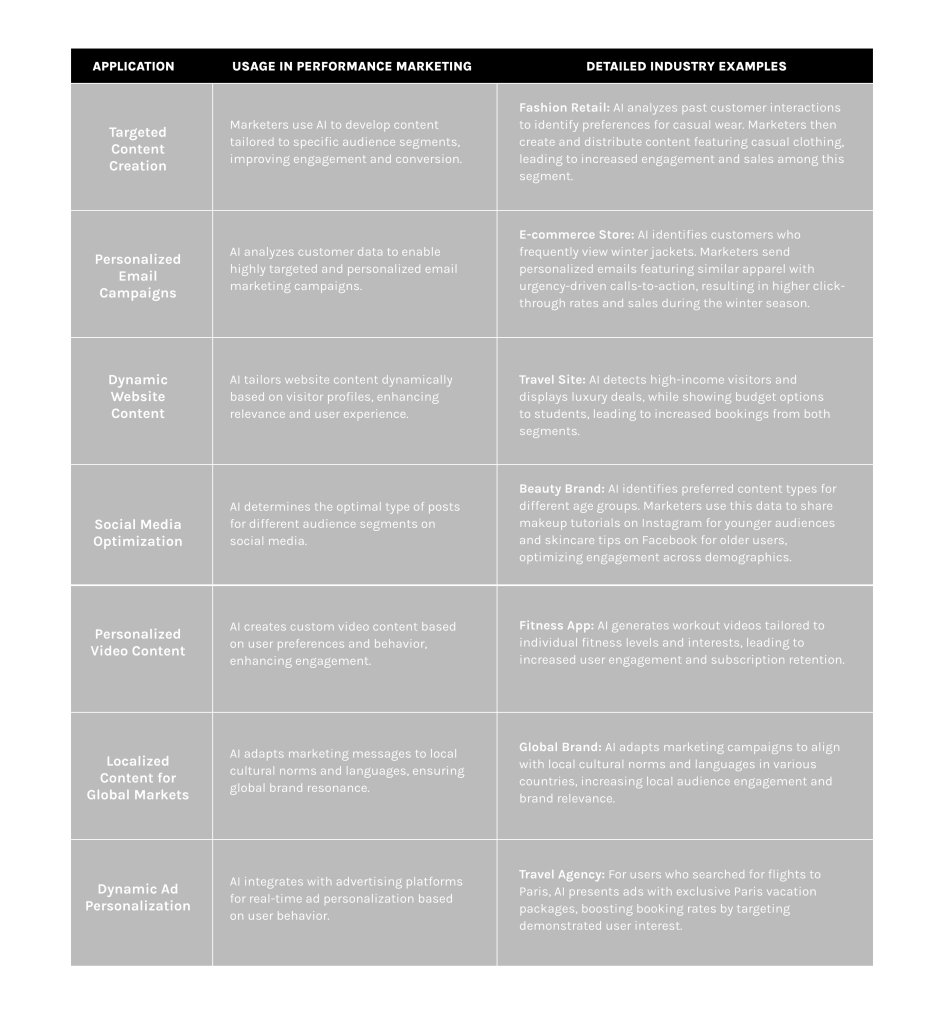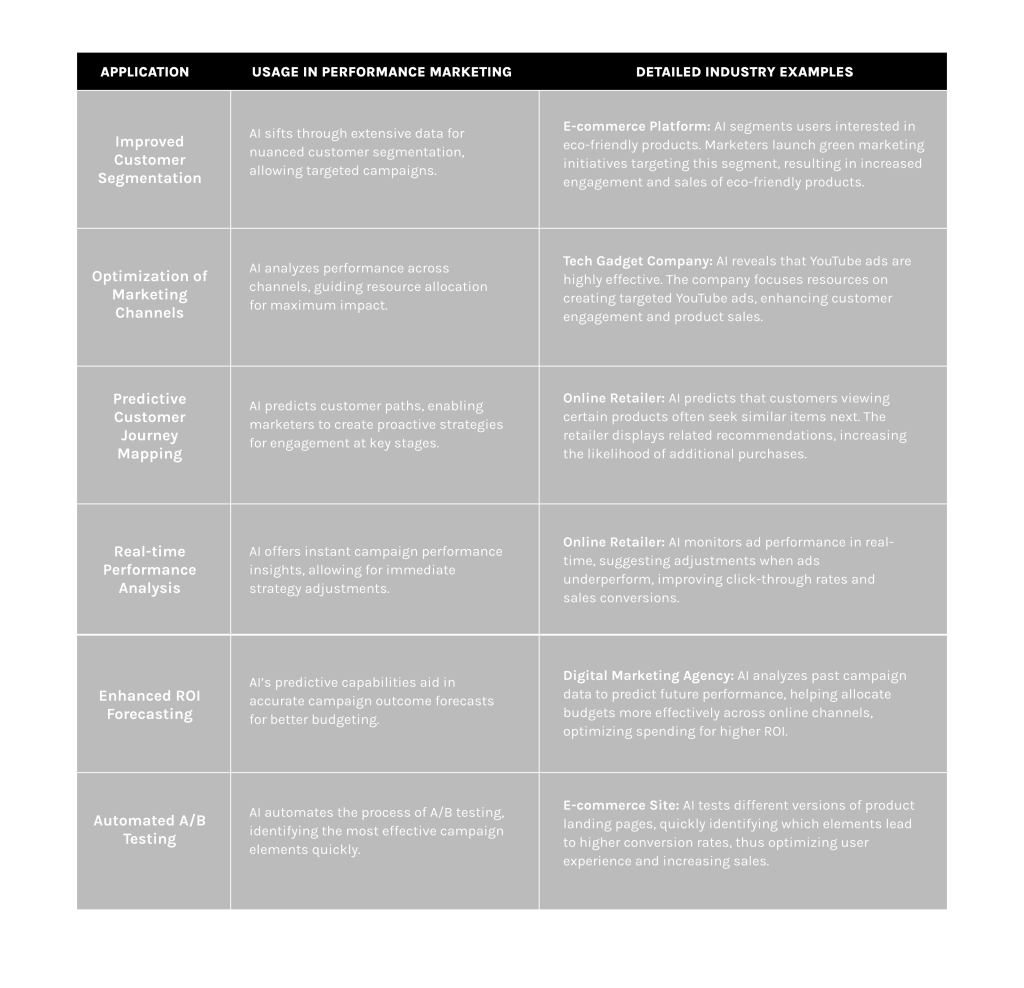5 AI and Content Marketing Innovations Shaping Performance Marketing in 2024

The digital marketing landscape is on a continuous evolution, one that's currently driven by rapid advancements in artificial intelligence and emerging technologies. These innovations are redefining the very nature of customer engagement and content creation - a paradigm shift that aligns closely with the growing demands for personalization and interactivity. The year 2024 is poised to be a pivotal moment, likely marking the full integration of these trends as fundamental elements in the dynamic marketing domain.
In this article, we explore the cutting-edge trends and tools poised to define the landscape of performance marketing in 2024. From harnessing the nuanced capabilities of predictive analytics to venturing into the creative frontiers of augmented reality narratives, we delve into how these technologies are set to transform brand engagement in the coming year. Our journey through these exciting innovations offers insights into the profound impact of AI and immersive technologies in creating more effective, engaging, and personalized performance marketing campaigns.

1. The Power of Predictive Analytics
Historically, predictive analytics have played a crucial role in decision-making processes across various industries, leveraging data, statistical algorithms, and machine learning techniques to identify the likelihood of future outcomes based on past data. This foundational approach has been profoundly transformed with the integration of generative AI, which has introduced a new dimension of complexity and capability.
In the context of performance marketing, AI-enhanced predictive analytics has opened up an overload of applications:


2. AI-Driven Content Personalization
AI-driven content personalization is fundamentally reshaping how brands engage with their audiences. At its core, this approach utilizes sophisticated machine learning algorithms that continuously evolve, enriched by every click, view, and interaction, which feeds back into the system, thereby refining future content delivery and adapting to user data to deliver highly relevant product recommendations.
The essence of this strategy lies in hyper-personalization techniques. Such methods delve deep into the fabric of user data, unraveling complex patterns of behavior, preferences, and engagement histories. This depth of analysis enables a level of customization that goes beyond standard personalization, creating a unique and dynamic user experience for each individual. As a result, consumers encounter content that resonates on a deeper level – from personalized email marketing to customized website experiences.
As we move into 2024, this AI-driven personalization is set to become even more sophisticated. With the integration of advanced analytics and predictive modeling, performance marketers can anticipate consumer needs even before they are aware of them. The advantages are manifold; brands can craft highly targeted marketing strategies, enhance customer engagement and loyalty, and optimize their marketing spend for maximum ROI. Here’s how:
- Dynamic Content Optimization in Real-Time Advertising: AI dynamically changes PPC ad content based on the user's recent browsing behavior. For instance, if a user recently viewed sports shoes, the AI immediately tailors the ad to show a special offer on sports shoes, boosting click-through and conversion rates.
- Predictive Customer Journey Mapping: AI algorithms predict a customer's next move in the marketing funnel. This enables performance marketers to trigger personalized engagement strategies, like email campaigns or social media ads, aligned with the customer's current decision-making phase.
- Personalized Email Marketing at Scale: AI tailors emails based on individual interactions, such as open rates and content preferences. Each recipient receives an email that feels uniquely crafted for them, enhancing engagement and conversion possibilities.
- Optimized Content Creation for SEO: AI tools suggest topics, keywords, and content structures likely to rank higher in search results, aiding in the creation of content that attracts organic traffic and boosts visibility and conversions.

3. Conversational AI and Chatbots
Consumers expect answers yesterday – and AI-powered chatbots are stepping up to meet this demand. The reason why they are so effective is due to their integration of advanced machine learning algorithms, enabling them to deliver tailored responses and recommendations with unprecedented accuracy and speed.
AI-powered chatbots serve as key players in personalizing user interactions at scale. They are equipped to handle a variety of tasks, including:
- Real-time customer query resolution
- Automated product recommendations
- Personalized content delivery
- Customer behavior analysis
- Lead generation and qualification
- Feedback collection and analysis
- Multilingual customer support

These chatbots are evolving to offer contextual upselling and cross-selling, enhancing the customer's shopping experience by suggesting relevant products based on their purchase history. Advanced behavioral analysis allows for more nuanced personalization, adjusting the conversation to match the customer's mood and preferences.
As we look forward to the evolving role of AI chatbots in marketing, it's exciting to anticipate how they will revolutionize customer engagement and business growth. The future promises enhanced interaction and a transformation in how brands connect with their audiences, with the following being the key areas poised to experience the most significant impact:
- Real-Time Customer Query Resolution: AI chatbots will become even more adept at providing instant, accurate responses to customer inquiries, further streamlining the decision-making process and enhancing conversion rates.
- Automated Product Recommendations: The future will see chatbots becoming more intuitive in suggesting products, leveraging a user's browsing and purchase history to increase average order values by recommending complementary items in e-commerce settings.
- Personalized Content Delivery: Chatbots will evolve to deliver even more precisely targeted content, utilizing deep insights into user interests to proactively offer relevant information.
- Customer Behavior Analysis for Targeted Marketing: Advancements in AI will enable chatbots to conduct more sophisticated analyses of customer interactions.
- Lead Generation and Qualification: Future chatbots will enhance their ability to interactively qualify leads, pinpointing prospects with the highest potential for conversion and optimizing marketing efforts.
- Feedback Collection and Analysis for Continuous Improvement: AI chatbots will play a crucial role in real-time feedback collection and analysis, driving continuous improvements in marketing strategies and customer engagement approaches.
- Multilingual Customer Support for Global Reach: With advancements in language processing, AI chatbots will offer more nuanced and natural multilingual support, significantly expanding a brand's global reach and customer engagement.

4. Natural Language Processing in Content Creation
Natural Language Processing (NLP) is revolutionizing content creation, empowering marketers to generate messages that truly resonate with their audience. By analyzing and understanding the subtleties of human language, NLP provides tools for dissecting intricate patterns in communication, which in turn aids in formulating messages that align precisely with the specific interests and preferences of different targeted segments.
In the table below, we delve into the diverse capabilities of NLP, highlighting how each contributes to refining and elevating content strategies, ultimately driving more meaningful and effective customer engagement.

The role of NLP in performance marketing is set to become even more influential as we advance. With ongoing developments in AI and machine learning, NLP tools are expected to gain enhanced capabilities in generating content that is not only linguistically accurate but also contextually rich and highly engaging. This progression will facilitate more precise audience targeting and personalization, ensuring that marketing messages reach and resonate with the right audience while significantly reducing the noise and clutter often associated with less targeted marketing efforts.

5. Augmented Reality Narratives
The latest innovations in Augmented Reality (AR) are setting the stage for a transformative shift in how brands engage with consumers. As a dynamic storytelling medium, AR offers an unprecedented opportunity for brands to craft narratives that captivate audiences in entirely new ways. This evolution is part of a broader trend towards an immersive internet, where digital experiences are seamlessly integrated into the physical world.
Among the most influential sectors being revolutionized by this technology are retail, real estate, automotive, and tourism. Customers can interact with virtual elements superimposed in the real world, turning passive viewing into an active, engaging experience. For instance:
- In retail, AR can be used for interactive product demonstrations, allowing consumers to virtually try items before purchasing.
- Similarly, AR can transform traditional property viewings by enabling potential buyers to visualize properties in 3D on their devices. They could, for instance, explore different furnishing options or see how the light changes throughout the day in a virtual model
- Car manufacturers can leverage AR for interactive showcases of vehicles. In this case, customers would be able to virtually test different models, customize features like color and interiors, and simulate driving experiences, either from their mobile devices or in a showroom.
- AR has the potential to enhance tourists' experiences by overlaying historical facts or virtual guides over real-world landmarks. For instance, visitors would enjoy an AR tour at a historical site where they see reconstructions of historical events or buildings as they walk through.
AR is further transforming performance marketing with its ability to create personalized, geo-targeted promotions. For instance, it enables location-based marketing where customers passing near a store could receive AR-enabled smartphone promotions (think something like a 3D model 'daily special' notification). This approach leverages location-based AR experiences to bridge the gap between digital engagement and physical retail spaces, driving foot traffic while gathering insightful consumer behavior and preferences data. Such an innovative approach seamlessly integrates with various marketing channels, including social media and email campaigns, elevating engagement rates and user interaction. Furthermore, the effectiveness of AR in performance marketing is validated through measurable outcomes. Engagement time, conversion rates, and customer feedback are meticulously tracked, showcasing AR as a strategic, results-driven tool that aligns with and fulfills marketing objectives.

The Bottom Line
The intersection of AI and content marketing is revolutionizing how brands communicate with their audience, harnessing the power of advanced algorithms to create more relevant, engaging, and personalized content. This union has led to a more dynamic and interactive marketing landscape, where consumer insights and creative strategies are seamlessly integrated for enhanced impact. Performance marketers are at the forefront of this transformation, utilizing these technologies to deepen customer relationships, drive engagement, and increase conversions.
Looking ahead, the long-term future is poised to be even more intertwined with these advancements. As tools evolve and integrate more deeply into marketing strategies, new horizons will open for customer engagement and brand storytelling.

At Creative Clicks, we're at the forefront of this evolution, ready to guide you through the complexities of these innovations and help you find the strategies that best fit your brand's unique needs and targets. Whether you're looking to refine your content strategy with NLP, engage customers through AR narratives, or harness the power of AI for predictive analytics and chatbots, we're here to show you the way. Get in touch with us at📥ccinquiries@creativeclicks.com to explore how these cutting-edge technologies can elevate your brand's performance marketing to new heights.
